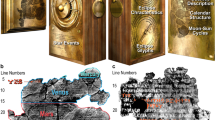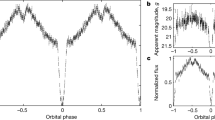Abstract
Colton and Martin1 are to be congratulated on the independent discovery of eclipse cycles based on a fixed number of lunations. The cycles that they list are among the long list of cycles which have been exhaustively studied and described in a rare book by Professor G. van den Bergh2 that is seldom found outside astronomical libraries. The particular cycles tabulated by Colton and Martin are named, in order of increasing length, Hepton, Octon, Inex, etc.
This is a preview of subscription content, access via your institution
Access options
Subscribe to this journal
Receive 51 print issues and online access
$199.00 per year
only $3.90 per issue
Buy this article
- Purchase on Springer Link
- Instant access to full article PDF
Prices may be subject to local taxes which are calculated during checkout
Similar content being viewed by others
References
Colton, R., and Martin, R. L., Nature, 213, 476 (1967).
van den Bergh, G., Periodicity and Variation of Solar and Lunar Eclipses (Tjecek Willink and Zoon, Holland, 1955).
Hawkins, G. S., Nature, 202, 1258 (1964).
Hawkins, G. S., Vistas in Astronomy, 10 (Pergamon Press, London, 1967).
Author information
Authors and Affiliations
Rights and permissions
About this article
Cite this article
HAWKINS, G. Stonehenge 56 Year Cycle. Nature 215, 604–605 (1967). https://doi.org/10.1038/215604a0
Received:
Issue Date:
DOI: https://doi.org/10.1038/215604a0
This article is cited by
-
Eclipse Prediction at Stonehenge
Nature (1969)
Comments
By submitting a comment you agree to abide by our Terms and Community Guidelines. If you find something abusive or that does not comply with our terms or guidelines please flag it as inappropriate.



